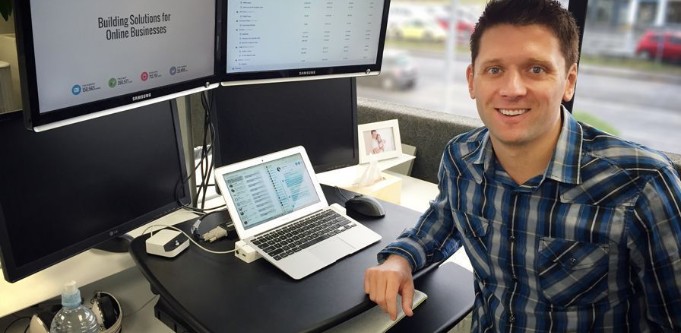
Doubledot Media chief executive officer Simon Slade.
It’s an unfortunate reality that entrepreneurs have to fall short sometimes in order to ensure they are breaking barriers and innovating. If you’ve never experienced failure as an entrepreneur, you’re not taking enough risks. Risk-taking is essential to discovering your industry’s next big innovation.
Today’s entrepreneurial world moves far too quickly for a business owner to remain stagnant and still be successful.
To stay afloat, you have to constantly improve and update your business processes. Products, customer service, marketing, hiring — every facet of your business needs to be put under a microscope and examined for ways it can be better.
The strategies you use to change and improve these processes will almost always require risk. In fact, the greatest improvements will come at great risk. Taking risks means coping with failure in pursuit of the next great innovation of your industry.
Calculated risk
Risk-taking is not equivalent to recklessness, which is not an advisable attribute for a business owner.
Rather than recklessness, which can sometimes be confused with ambition or courage, entrepreneurs should be balanced.
A good business owner will combine conservative investment and careful risk calculation. Risk calculation includes examining the potential benefits, the potential fallout, all the possible scenarios, and other associated consequences.
The most challenging thing about risk calculation is that it’s entirely circumstantial — there is no simple formula, no obvious set of steps. Sometimes, a risk will be worth taking even if the potential benefits are minor, so long as the potential fallout is minor too.
Sometimes, even if there are major benefits associated with a certain risk, it won’t be worth taking because the fallout threatens your livelihood or the livelihood of your employees. The consequences of any business decision are both human and financial, both short term and long term.
And risk calculation can never be flawless. There is always an unseen detail or a missing factor that can throw off your calculation. This is why it’s called a risk.
Inevitable failure
One important factor in risk calculation is to truly prepare yourself for the potential fallout. Failure is inevitable. The sooner you can accept that, the more successful you will be as an entrepreneur. Risk aversion comes from a fear of failure — these two qualities are deeply intertwined. When you embrace risk, you must embrace failure as an expected component of risk.
My company took a chance early on and contracted a web design agency for a large project. We paid the agency $35,000 and they provided us with a product that we simply could not use. We had lost a hugely significant sum for a startup.
We resorted to hiring a freelancer who charged us far less. That person ended up generating an excellent product that we were proud of.
This was a financial failure, but what we lost in money, we gained in experience — contracting freelancers has remained a huge part of our business model and we tend to avoid working with large agencies.
If not for the risk and subsequent failure, it might have taken us a lot longer to arrive at this very effective business model that served us well in the subsequent years.
Innovation
Risk implies failure, and failure ensures that you are discovering what doesn’t work and replacing it with what works better. This is innovation — the pot of gold at the end of a long, hard rainbow.
Innovation is finding a better way to do business. This might mean improving how you complete a business process, such as hiring, marketing, selling, expansion, branding or onboarding. It might mean discovering a new way of doing business entirely, such as breaking into a new niche or industry, creating a new service or product.
The only way to discover a better way (innovate) is to try a different way (take a risk).
Courage and confidence
The process of risk, failure and innovation requires courage and confidence — again, not to be confused with recklessness.
This system is vital to business growth and success, so entrepreneurs have to tap into their inner strength in order to take the right chances, learn from their mistakes, and find a better way of doing business.
It’s not always easy, but it is always worth it.
COMMENTS
SmartCompany is committed to hosting lively discussions. Help us keep the conversation useful, interesting and welcoming. We aim to publish comments quickly in the interest of promoting robust conversation, but we’re a small team and we deploy filters to protect against legal risk. Occasionally your comment may be held up while it is being reviewed, but we’re working as fast as we can to keep the conversation rolling.
The SmartCompany comment section is members-only content. Please subscribe to leave a comment.
The SmartCompany comment section is members-only content. Please login to leave a comment.